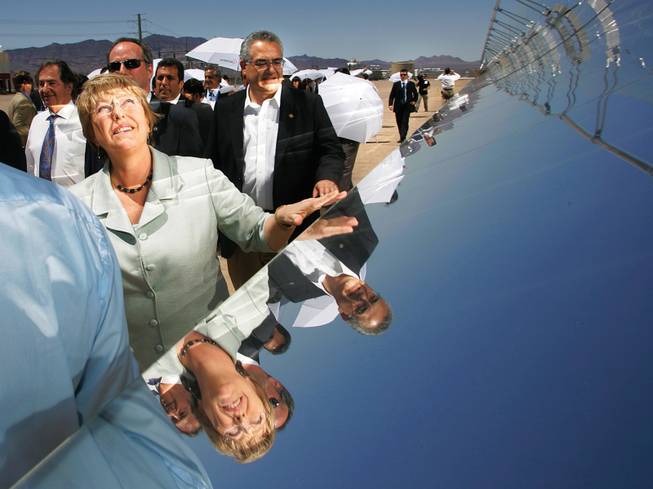
President Michelle Bachelet of Chile takes a tour of Acciona’s 64-megawatt, 400-acre Nevada Solar One array in Boulder City in June.
Saturday, Oct. 11, 2008 | 2 a.m.
Buffeted by worldwide economic turmoil, some investors are pumping cash into renewable energy companies with ties to Nevada, saying the bipartisan political support being heaped on the industry all but makes it a safe harbor for investments.
Adding to its attraction: Inventive entrepreneurs are forsaking Internet-based businesses in favor of what they see as a more stable clean-technology industry.
“People see the argument for energy security, see the argument for public policy to continue to enhance these industries,” said Mark Donohue, the clean technology entrepreneur-in-residence at Babson College in Babson Park, Mass., and an expert on clean-energy investment. “There’s already a lot of good business momentum in these sectors, so it’s logical that it would do better than the general stock market. And I think we’ll see even more support for (clean technology) and investment as we come closer to the election.”
But talk of growth among renewable energy companies comes with a cautionary note: As financial markets around the globe decline and more lenders go into bankruptcy, it may be more difficult for renewable developers to get the loans they need to build their big projects.
Among the indicators that renewable energy investments are faring well:
• Reno-based wind spire company Mariah Power says it has raised enough money to launch a more powerful wind turbine, open a manufacturing plant in Michigan and pursue research and development of wind-powered parking lot lights, street lights and residential rooftop models.
• Ausra, a California-based solar developer with a factory in Las Vegas, is tapping $60.6 million in its latest round of equity financing to fund research and product development and commercial activities, including the completion of a 5-megawatt solar thermal power project near Bakersfield, Calif., and a ramping up of manufacturing activity in the Nevada factory.
• Even as overall venture-capital investments are down by 5 percent, such investment in the renewable energy sector has increased by more than 30 percent to about $1.65 billion.
Ernst & Young reported last week it would invest at least $270 billion in the next decade to fight climate change — a campaign that will lean on the development of renewable energy.
• While the Dow Jones industrial average and Standard & Poor’s index have nosedived over the past year, indexes of publicly traded clean energy companies have continued to increase dramatically.
The Jefferies Global Clean Technology Composite Index is up 19 percent this year compared with last year. And the Cleantech Venture Network announced last week a record investment in clean technology companies in the third quarter with $2.6 billion of investment in 158 companies in the network, breaking the previous record of $2.2 billion in the second quarter.
Investment in clean technology companies listed in Cleantech rose 37 percent compared with the same period a year ago.
The London Alternative Investment Market, which also has listings for several clean energy and technology companies, is also up compared with last year.
The recent passage of legislation extending tax credits to renewable energy developers is expected to further boost investment in the sector.
The expiration of the credits at the end of 2008 was considered a major hurdle to further clean energy development in the United States. Industry associations reported investors were leery of putting large pots of money into an industry with unresolved financial issues. The legislation includes a one-year extension of tax incentives for wind energy development and the eight-year extension of tax incentives for all other types of renewable energy development.
Some utility-scale wind developers and almost all solar developers depend on the tax credits to trim the cost of construction so their power is competitively priced.
Now that the incentives have been signed into law, the renewable energy industry foresees increased investment on a massive scale in the next decade. The sector has the capacity to generate more than 400,000 jobs in key industries such as manufacturing and construction.
Nevada stands to benefit more than any other state. The Energy Department says Nevada has enough solar energy capacity to power the entire nation. The state also claims some of the most significant geothermal energy hot spots in the nation.
But even as the industry is buoyed by the tax credit extensions, it is facing a new challenge.
Before the collapse of the financial industry, renewable projects such as solar and wind arrays generally had been able to get long-term loans — often from multiple sources — for a specific project. To get to that point, they usually had significant investment in place, the permit process completed and a guaranteed income source from long-term energy contracts with regional and local utilities.
Acciona’s Nevada Solar One array in Boulder City, for example, expects to pay back its loan within 20 years. The array has a life span of at least 40 years, meaning it can guarantee a return to investors after its bills are paid.
But as the credit market continues to tighten, some in the industry worry that the lack of capital could slow industry growth.
“All ships rise and fall with the tides,” Donohue said. “Clearly as we have declining liquidity, declining investment, declining purchase across most industries, an industry as broad-based as renewable energy is going to have to experience some contraction in its growth rate. Maybe not its overall growth, but the rate of growth could be slowed by the global contraction.”
A longer version of this story appeared in this week’s In Business Las Vegas.

Join the Discussion:
Check this out for a full explanation of our conversion to the LiveFyre commenting system and instructions on how to sign up for an account.
Full comments policy